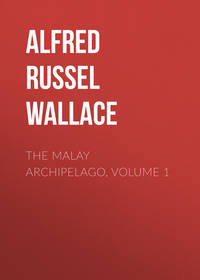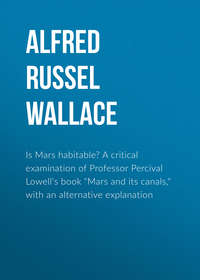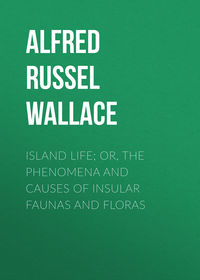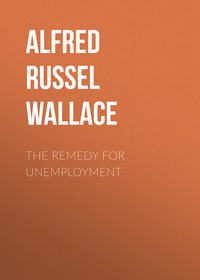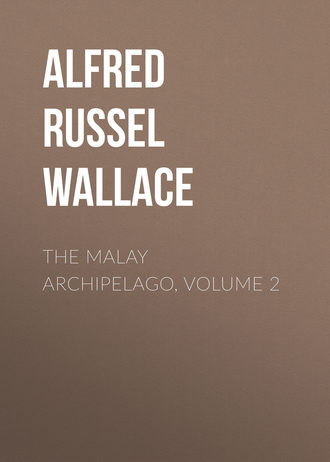 полная версия
полная версияThe Malay Archipelago, Volume 2
In most of the villages of this part of Ceram are schools and native schoolmasters, and the inhabitants have been long converted to Christianity. In the larger villages there are European missionaries; but there is little or no external difference between the Christian and Alfuro villages, nor, as far as I have seen, in their inhabitants. The people seem more decidedly Papuan than those of Gilolo. They are darker in colour, and a number of them have the frizzly Papuan hair; their features also are harsh and prominent, and the women in particular are far less engaging than those of the Malay race. Captain Van der Beck was never tired of abusing the inhabitants of these Christian villages as thieves, liars, and drunkards, besides being incorrigibly lazy. In the city of Amboyna my friends Doctors Mohnike and Doleschall, as well as most of the European residents and traders, made exactly the same complaint, and would rather have Mahometans for servants, even if convicts, than any of the native Christians. One great cause of this is the fact, that with the Mahometans temperance is a part of their religion, and has become so much a habit that practically the rule is never transgressed. One fertile source of want, and one great incentive to idleness and crime, is thus present with the one class, but absent in the other; but besides this the Christians look upon themselves as nearly the equals of the Europeans, who profess the same religion, and as far superior to the followers of Islam, and are therefore prone to despise work, and to endeavour to live by trade, or by cultivating their own land. It need hardly be said that with people in this low state of civilization religion is almost wholly ceremonial, and that neither are the doctrines of Christianity comprehended, nor its moral precepts obeyed. At the same time, as far as my own experience goes, I have found the better class of "Orang Sirani" as civil, obliging, and industrious as the Malays, and only inferior to them from their tendency to get intoxicated.
Having written to the Assistant Resident of Saparua (who has jurisdiction over the opposite part of the coast of Ceram) for a boat to pursue my journey, I received one rather larger than necessary with a crew of twenty men. I therefore bade adieu to my kind friend Captain Van der Beck, and left on the evening after its arrival for the village of Elpiputi, which we reached in two days. I had intended to stay here, but not liking the appearance of the place, which seemed to have no virgin forest near it, I determined to proceed about twelve miles further up the bay of Amahay, to a village recently formed, and inhabited by indigenes from the interior, and where some extensive cacao plantations were being made by some gentlemen of Amboyna. I reached the place (called Awaiya) the same afternoon, and with the assistance of Mr. Peters (the manager of the plantations) and the native chief, obtained a small house, got all my things on shore, and paid and discharged my twenty boatmen, two of whom had almost driven me to distraction by beating tom-toms the whole voyage.
I found the people here very nearly in a state of nature, and going almost naked. The men wear their frizzly hair gathered into a flat circular knot over the left temple, which has a very knowing look, and in their ears cylinders of wood as thick as one's finger, and coloured red at the ends. Armlets and anklets of woven grass or of silver, with necklaces of beads or of small fruits, complete their attire. The women wear similar ornaments, but have their hair loose. All are tall, with a dark brown skin, and well marked Papuan physiognomy. There is an Amboyna schoolmaster in the village, and a good number of children attend school every morning. Such of the inhabitants as have become Christians may be known by their wearing their hair loose, and adopting to some extent the native Christian dress-trousers and a loose shirt. Very few speak Malay, all these coast villages having been recently formed by inducing natives to leave the inaccessible interior. In all the central part of Ceram there new remains only one populous village in the mountains. Towards the east and the extreme west are a few others, with which exceptions all the inhabitants of Ceram are collected on the coast. In the northern and eastern districts they are mostly Mahometans, while on the southwest coast, nearest Amboyna, they are nominal Christians. In all this part of the Archipelago the Dutch make very praiseworthy efforts to improve the condition of the aborigines by establishing schoolmasters in every village (who are mostly natives of Amboyna or Saparua, who have; been instructed by the resident missionaries), and by employing native vaccinators to prevent the ravages of smallpox. They also encourage the settlement of Europeans, and the formation of new plantations of cacao and coffee, one of the best means of raising the condition of the natives, who thus obtain work at fair wages, and have the opportunity of acquiring something of European tastes and habits.
My collections here did not progress much better than at my former station, except that butterflies were a little more plentiful, and some very fine species were to be found in the morning on the sea-beach, sitting so quietly on the wet sand that they could be caught with the fingers. In this way I had many fine specimens of Papilios brought me by the children. Beetles, however, were scarce, and birds still more so, and I began to think that the handsome species which I had so often heard were found in Ceram must be entirely confined to the eastern extremity of the island.
A few miles further worth, at the head of the Bay of Amahay, is situated the village of Makariki, from whence there is a native path quite across the island to the north coast. My friend Mr. Rosenberg, whose acquaintance I had made at New Guinea, and who was now the Government superintendent of all this part of Ceram, returned from Wahai, on the north coast, after I had been three weeks at Awaiya, and showed me some fine butterflies he had obtained on the mountain streams in the interior. He indicated a spot about the centre of the island where he thought I might advantageously stay a few days. I accordingly visited Makariki with him the next day, and he instructed the chief of the village to furnish me with men to carry my baggage, and accompany me on my excursion. As the people of the village wanted to be at home on Christmas-day, it was necessary to start as soon as possible; so we agreed that the men should be ready in two days, and I returned to make my arrangements.
I put up the smallest quantity of baggage possible for a six days' trip, and on the morning of December 18th we left Makariki, with six men carrying my baggage and their own provisions, and a lad from Awaiya, who was accustomed to catch butterflies for me. My two Amboyna hunters I left behind to shoot and skin what birds they could while I was away. Quitting the village, we first walked briskly for an hour through a dense tangled undergrowth, dripping wet from a storm of the previous night, and full of mud holes. After crossing several small streams we reached one of the largest rivers in Ceram, called Ruatan, which it was necessary to cross. It was both deep and rapid. The baggage was first taken over, parcel by parcel, on the men's heads, the water reaching nearly up to their armpits, and then two men returned to assist me. The water was above my waist, and so strong that I should certainly have been carried off my feet had I attempted to cross alone; and it was a matter of astonishment to me how the men could give me any assistance, since I found the greatest difficulty in getting my foot down again when I had once moved it off the bottom. The greater strength and grasping power of their feet, from going always barefoot, no doubt gave them a surer footing in the rapid water.
After well wringing out our wet clothes and putting them on, we again proceeded along a similar narrow forest track as before, choked with rotten leaves and dead trees, and in the more open parts overgrown with tangled vegetation. Another hour brought us to a smaller stream flowing in a wide gravelly bed, up which our road lay. Here w e stayed half an hour to breakfast, and then went on, continually crossing the stream, or walking on its stony and gravelly banks, till about noon, when it became rocky and enclosed by low hills. A little further we entered a regular mountain-gorge, and had to clamber over rocks, and every moment cross and recross the water, or take short cuts through the forest. This was fatiguing work; and about three in the afternoon, the sky being overcast, and thunder in the mountains indicating an approaching storm, we had to loon out for a camping place, and soon after reached one of Mr. Rosenberg's old ones. The skeleton of his little sleeping-hut remained, and my men cut leaves and made a hasty roof just as the rain commenced. The baggage was covered over with leaves, and the men sheltered themselves as they could till the storm was over, by which time a flood came down the river, which effectually stopped our further march, even had we wished to proceed. We then lighted fires; I made some coffee, and my men roasted their fish and plantains, and as soon as it was dark, we made ourselves comfortable for the night.
Starting at six the next morning, we had three hours of the same kind of walking, during which we crossed the river at least thirty or forty times, the water being generally knee-deep. This brought us to a place where the road left the stream, and here we stopped to breakfast. We then had a long walk over the mountain, by a tolerable path, which reached an elevation of about fifteen hundred feet above the sea. Here I noticed one of the smallest and most elegant tree ferns I had ever seen, the stem being scarcely thicker than my thumb, yet reaching a height of fifteen or twenty feet. I also caught a new butterfly of the genus Pieris, and a magnificent female specimen of Papilio gambrisius, of which I had hitherto only found the males, which are smaller and very different in colour. Descending the other side of the ridge, by a very steep path, we reached another river at a spot which is about the centre of the island, and which was to be our resting place for two or three days. In a couple of hour my men had built a little sleeping-shed for me, about eight feet by four, with a bench of split poles, they themselves occupying two or three smaller ones, which had been put up by former passengers.
The river here was about twenty yards wide, running over a pebbly and sometimes a rocky bed, and bordered by steep hills with occasionally flat swampy spots between their base and the stream. The whole country was one dense, Unbroken, and very damp and gloomy virgin forest. Just at our resting-place there was a little bush-covered island in the middle of the channel, so that the opening in the forest made by the river was wider than usual, and allowed a few gleams of sunshine to penetrate. Here there were several handsome butterflies flying about, the finest of which, however, escaped me, and I never saw it again during my stay. In the two days and a half which we remained here, I wandered almost all day up and down the stream, searching after butterflies, of which I got, in all, fifty or sixty specimens, with several species quite new to me. There were many others which I saw only once, and did not capture, causing me to regret that there was no village in these interior valleys where I could stay a month. In the early part of each morning I went out with my gun in search of birds, and two of my men were out almost all day after deer; but we were all equally unsuccessful, getting absolutely nothing the whole time we were in the forest. The only good bird seen was the fine Amboyna lory, but these were always too high to shoot; besides this, the great Moluccan hornbill, which I did not want, was almost the only bird met with. I saw not a single ground-thrush, or kingfisher, or pigeon; and, in fact, have never been in a forest so utterly desert of animal life as this appeared to be. Even in all other groups of insects, except butterflies, there was the same poverty. I bad hoped to find some rare tiger beetles, as I had done in similar situations in Celebes; but, though I searched closely in forest, river-bed, and mountain-brook, I could find nothing but the two common Amboyna species. Other beetles there were absolutely none.
The constant walking in water, and over rocks and pebbles, quite destroyed the two pair of shoes I brought with me, so that, on my return, they actually fell to pieces, and the last day I had to walk in my stockings very painfully, and reached home quite lame. On our way back from Makariki, as on our way there, we had storm and rain at sea, and we arrived at Awaiya late in the evening, with all our baggage drenched, and ourselves thoroughly uncomfortable. All the time I had been in Ceram I had suffered much from the irritating bites of an invisible acarus, which is worse than mosquitoes, ants, and every other pest, because it is impossible to guard against them. This last journey in the forest left me covered from head to foot with inflamed lumps, which, after my return to Amboyna, produced a serious disease, confining me to the house for nearly two months, a not very pleasant memento of my first visit to Ceram, which terminated with the year 1859.
It was not till the 24th of February, 1860, that I started again, intending to pass from village to village along the coast, staying where I found a suitable locality. I had a letter from the Governor of the Moluccas, requesting all the chiefs to supply me with boats and men to carry me on my journey. The first boat took me in two days to Amahay, on the opposite side of the bay to Awaiya. The chief here, wonderful to relate, did not make any excuses for delay, but immediately ordered out the boat which was to carry me on, put my baggage on hoard, set up mast and sails after dark, and had the men ready that nigh; so that we were actually on our way at five the next morning,—a display of energy and activity I scarcely ever saw before in a native chief on such an occasion. We touched at Cepa, and stayed for the night at Tamilan, the first two Mahometan villages on the south coast of Ceram. The next day, about noon, we reached Hoya, which was as Far as my present boat and crew were going to take me. The anchorage is about a mile east of the village, which is faced by coral reefs, and we had to wait for the evening tide to move up and unload the boat into the strange rotten wooden pavilion kept for visitors.
There was no boat here large enough to take my baggage; and although two would have done very well, the Rajah insisted upon sending four. The reason of this I found was, that there were four small villages under his rule, and by sending a boat from each he would avoid the difficult task of choosing two and letting off the others. I was told that at the next village of Teluti there were plenty of Alfuros, and that I could get abundance of Tories and other birds. The Rajah declared that black and yellow Tories and black cockatoos were found there; but I am inclined to think he knew very well he was telling me lies, and that it was only a scheme to satisfy me with his plan of taking me to that village, instead of a day's journey further on, as I desired. Here, as at most of the villages, I was asked for spirits, the people being mere nominal Mahometans, who confine their religion almost entirely to a disgust at pork, and a few other forbidden articles of food. The next morning, after much trouble, we got our cargoes loaded, and had a delightful row across the deep bay of Teluti, with a view of the grand central mountain-range of Ceram. Our four boats were rowed by sixty men, with flags flying and tom-toms beating, as well as very vigorous shouting and singing to keep up their spirits. The sea way smooth, the morning bright, and the whole scene very exhilarating. On landing, the Orang-kaya and several of the chief men, in gorgeous silk jackets, were waiting to receive us, and conducted me to a house prepared for my reception, where I determined to stay a few days, and see if the country round produced anything new.
My first inquiries were about the lories, but I could get very little satisfactory information. The only kinds known were the ring-necked lory and the common red and green lorikeet, both common at Amboyna. Black Tories and cockatoos were quite unknown. The Alfuros resided in the mountains five or six days' journey away, and there were only one or two live birds to be found in the village, and these were worthless. My hunters could get nothing but a few common birds; and notwithstanding fine mountains, luxuriant forests, and a locality a hundred miles eastward, I could find no new insects, and extremely few even of the common species of Amboyna and West Ceram. It was evidently no use stopping at such a place, and I was determined to move on as soon as possible.
The village of Teluti is populous, but straggling and very dirty. Sago trees here cover the mountain side, instead of growing as usual in low swamps; but a closer examination shows that they grow in swampy patches, which have formed among the loose rocks that cover the ground, and which are kept constantly full of moisture by the rains, and by the abundance of rills which trickle down among them. This sago forms almost the whole subsistence of the inhabitants, who appear to cultivate nothing but a few small patches of maize and sweet potatoes. Hence, as before explained, the scarcity of insects. The Orang-kaya has fine clothes, handsome lamps, and other expensive European goods, yet lives every day on sago and fish as miserably as the rest.
After three days in this barren place I left on the morning of March 6th, in two boats of the same size as those which had brought me to Teluti. With some difficulty I had obtained permission to take these boats on to Tobo, where I intended to stay a while, and therefore got on pretty quickly, changing men at the village of Laiemu, and arriving in a heavy rain at Ahtiago. As there was a good deal of surf here, and likely to be more if the wind blew hard during the night, our boats were pulled up on the beach; and after supping at the Orang-kaya's house, and writing down a vocabulary of the language of the Alfuros, who live in the mountains inland, I returned to sleep in the boat. Next morning we proceeded, changing men at Warenama, and again at Hatometen, at both of which places there was much surf and no harbour, so that the men had to go on shore and come on board by swimming. Arriving in the evening of March 7th at Batuassa, the first village belonging to the Rajah of Tobo, and under the government of Banda, the surf was very heavy, owing to a strong westward swell. We therefore rounded the rocky point on which the village was situated, but found it very little better on the other side. We were obliged, however, to go on shore here; and waiting till the people on the beach had made preparations, by placing a row of logs from the water's edge on which to pull up our boats, we rowed as quickly as we could straight on to them, after watching till the heaviest surfs had passed. The moment we touched ground our men all jumped out, and, assisted by those on shore, attempted to haul up the boat high and dry, but not having sufficient hands, the surf repeatedly broke into the stern. The steepness of the beach, however, prevented any damage being done, and the other boat having both crews to haul at it, was got up without difficulty.
The next morning, the water being low, the breakers were at some distance from shore, and we had to watch for a smooth moment after bringing the boats to the water's edge, and so got safely out to sea. At the two next villages, Tobo and Ossong, we also took in fresh men, who came swimming through the surf; and at the latter place the Rajah came on board and accompanied me to Kissalaut, where he has a house which he lent me during my stay. Here again was a heavy surf, and it was with great difficulty we got the boats safely hauled up. At Amboyna I had been promised at this season a calm sea and the wind off shore, but in this case, as in every other, I had been unable to obtain any reliable information as to the winds and seasons of places distant two or three days' journey. It appears, however, that owing to the general direction of the island of Ceram (E.S.E. and W.N.W.), there is a heavy surf and scarcely any shelter on the south coast during the west monsoon, when alone a journey to the eastward can be safely made; while during the east monsoon, when I proposed to return along the north coast to Wahai, I should probably find that equally exposed and dangerous. But although the general direction of the west monsoon in the Banda sea causes a heavy swell, with bad surf on the coast, yet we had little advantage of the wind; for, owing I suppose to the numerous bays and headlands, we had contrary south-east or even due east winds all the way, and had to make almost the whole distance from Amboyna by force of rowing. We had therefore all the disadvantages, and none of the advantages, of this west monsoon, which I was told would insure me a quick and pleasant journey.
I was delayed at Kissa-laut just four weeks, although after the first three days I saw that it would be quite useless for me to stay, and begged the Rajah to give me a prau and men to carry me on to Goram. But instead of getting one close at hand, he insisted on sending several miles off; and when after many delays it at length arrived, it was altogether unsuitable and too small to carry my baggage. Another was then ordered to be brought immediately, and was promised in three days, but doable that time elapsed and none appeared, and we were obliged at length to get one at the adjoining village, where it might have been so much more easily obtained at first. Then came caulking and covering over, and quarrels between the owner and the Rajah's men, which occupied more than another ten days, during all which time I was getting absolutely nothing, finding this part of Ceram a perfect desert in zoology, although a most beautiful country, and with a very luxuriant vegetation. It was a complete puzzle, which to this day I have not been able to understand; the only thing I obtained worth notice during my month's stay here being a few good land shells.
At length, on April 4th, we succeeded in getting away in our little boat of about four tons burthen, in which my numerous boxes were with difficulty packed so as to leave sleeping and cooling room. The craft could not boast an ounce of iron or a foot of rope in any part of its construction, nor a morsel of pitch or paint in its decoration. The planks were fastened together in the usual ingenious way with pegs and rattans. The mast was a bamboo triangle, requiring no shrouds, and carrying a long mat sail; two rudders were hung on the quarters by rattans, the anchor was of wood, and a long and thick rattan; served as a cable. Our crew consisted of four men, whose pole accommodation was about three feet by four in the bows and stern, with the sloping thatch roof to stretch themselves upon for a change. We had nearly a hundred miles to go, fully exposed to the swell of the Banda sea, which is sometimes very considerable; but we luckily had it calm and smooth, so that we made the voyage in comparative comfort.
On the second day we passed the eastern extremity of Ceram, formed of a group of hummocky limestone hills; and, sailing by the islands of Kwammer and Keffing, both thickly inhabited, came in sight of the little town of Kilwaru, which appears to rise out of the sea like a rustic Venice. This place has really a most extraordinary appearance, as not a particle of land or vegetation can be seen, but a long way out at sea a large village seems to float upon the water. There is of course a small island of several acres in extent; but the houses are built so closely all round it upon piles in the water, that it is completely hidden. It is a place of great traffic, being the emporium for much of the produce of these Eastern seas, and is the residence of many Bugis and Ceramese traders, and appears to have been chosen on account of its being close to the only deep channel between the extensive shoals of Ceram-laut and those bordering the east end of Ceram. We now had contrary east winds, and were obliged to pole over the shallow coral reefs of Ceram-laut for nearly thirty miles. The only danger of our voyage was just at its termination, for as we were rowing towards Manowolko, the largest of the Goram group, we were carried out so rapidly by a strong westerly current, that I was almost certain at one time we should pass clear of the island; in which case our situation would have been both disagreeable and dangerous, as, with the east wind which had just set in, we might have been unable to return for many days, and we had not a day's water on board. At the critical moment I served out some strong spirits to my men, which put fresh vigour into their arms, and carried us out of the influence of the current before it was too late.





